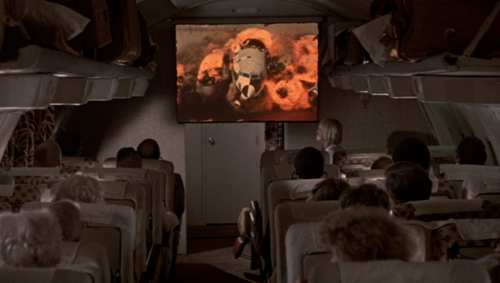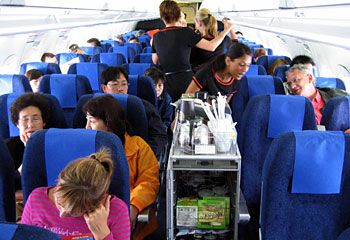Under normal circumstances, I would find the idea of people watching me sleep distasteful, at best. We rarely - if ever - sleep in front of people to whom we aren't related, or with whom we aren't involved. When was the last time strangers saw you sleep? Ten bucks says it was on either an airplane or a bus.

I slept on the plane from Honolulu to Chicago, as did a great many other people on that place. I got me thinking about the personal norms and boundaries we relax when we fly. It isn't just sleeping in front of strangers, it's all of the little indignities that attend sleep and its aftermath: the stretches, the yawns, the breath and breathing, the open mouths, the snoring, the occasional bit of drool, etc., etc. These are things that are normally only seen by our intimates. As Paul Reiser has noted in his comedy, and William Ian Miller argues extensively (and compellingly) in The Anatomy of Disgust, these little - occasionally gross - indignities represent a strong social boundary. We relax our personal boundaries and expand what are normally private matters for those we love.

Think about the various boundaries we blur or standards we lower when we travel. It isn't just that we sleep in front of others, it's that we eat food we normally would not, or at least not for what we're required to pay on a flight ($9.00 for a crappy set of spreads and crackers? Really, United?). We watch movies we wouldn't watch unless captive (I suffered through "One for the Money" - which I recommend avoiding at all possible costs - but even in such captivity I refused the offering of "The Vow"). We are forced to tolerate the screaming infants we wouldn't in almost any other setting. The private rules by which we live our lives are suspended when we travel.

Nowhere is this more obvious that in the indignities we suffer in security. Where else would we possibly agree to stand in line for the privilege of removing our shoes, having our personal items x-rayed, and having naked pictures taken of us?

And all of this as a matter of course. We rarely even think of what an incredible intrusion this would be in almost any other circumstance. Most of the time we just do it.

My point, I suppose, is that while I've mostly written about how society and social norms interact with our official rules and laws, those aren't the only times that society dictates reinterpretations of a set of rules or norms. In the case I'm exploring here, it's the personal rules that we normally thinking as not only traveling with us but as being part of our identity - our standards are most assuredly part of who we are.
But even these rules that we consider part of our very persona - and that we allegedly take with us wherever we go - are subject to the vagaries and impacts of the social settings between which we constantly move. Just as we use words with our friends down at the bar that we wouldn't use with our significant other's parents, things we absolutely wouldn't allow at work, at school, at a restaurant, or even in our homes (most of the time) we take as a matter of course in an airport or on a plane.

So the next time some one sneezes next to you on a plane, or reveals a secret that seems a little too personal, or in someway offends your sense of decorum, consider the setting. I'm not saying forgive the others immediately - what would the fun in that be - but rather to encourage you to think about the inherent flexibility built into your standards that often flies under the radar.
No comments:
Post a Comment